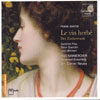Martin (Le) Vin herbé
The Tristan story as you've never heard it before: a deeply moving experience
View record and artist detailsRecord and Artist Details
Composer or Director: Frank Martin
Genre:
Vocal
Label: Harmonia Mundi
Magazine Review Date: 7/2007
Media Format: CD or Download
Media Runtime: 0
Mastering:
Stereo
DDD
Catalogue Number: HMC901935/6

Tracks:
| Composition | Artist Credit |
|---|---|
| (Le) Vin herbé |
Frank Martin, Composer
Berlin RIAS Chamber Choir Berlin Scharoun Ensemble Daniel Reuss, Conductor Frank Martin, Composer Sandrine Piau, Soprano Steve Davislim, Tenor |
Author: Marc Rochester
Scored for 12 voices, piano and string septet, Frank Martin’s setting of the legend of Tristan and Isolde, with its very understated emotions, sparse texture and deliberately limited harmonic vocabulary, has enjoyed a somewhat chequered history on record. The RIAS Chamber Choir bring rather more than 12 voices to this recording – including the eight principal solo roles, there are 29 singers listed – but they do preserve the intimacy and directness of expression which is so essential in any performance. It is clearly not to enrich the overall body of sound that Daniel Reuss has brought in so many voices, but he has clearly selected them, both in ensemble and solo, with painstaking care to underline the essential character of each of the individual tableaux, and even at the most climactic moments I doubt that there are more than a handful singing together.
Such an approach pays remarkable dividends in that it allows the three main sections of the work to focus more clearly on their very different specific human characteristics. In the first, “The Love Potion”, while their love may have been chemically induced, there is no doubting the sense of mutual affection and respect with which the calm stateliness of Steve Davislim and the unaffected poise of Sandrine Piau portray Tristan and Isolde. The second, “The Forest of Morois”, deals with compassion and forgiveness, and Jonathan de la Paz Zaens’s portrayal of King Mark exudes profound goodness in a way which sheds a totally new light on the word “kingly”. The third, “Death”, covers jealousy and reconciliation and I find Hildegard Wiedemann utterly convincing in the somewhat difficult role of the vaguely treacherous Isolde of the White Hands.
Alongside all this runs a beautifully crafted instrumental accompaniment, far more involved in the drama than the booklet-notes imply by suggesting that it is “like the scenery in a play”. There is immense sensitivity in the way the individual members of the Scharoun Ensemble – especially the pianist, Majella Stockhausen-Riegelbauer – handle the amazingly fluid instrumental textures, the very understatedness of which drives the fundamental message home far more powerfully than a whole plethora of dramatic orchestral gestures. Driven along with a powerful sense of urgency by Reuss, this is an intense and deeply moving performance which, complete with lavish packaging and superlative recorded sound, brings to the catalogue something which it has never had before; a really first-rate and compelling performance of this most important of Martin scores.
Such an approach pays remarkable dividends in that it allows the three main sections of the work to focus more clearly on their very different specific human characteristics. In the first, “The Love Potion”, while their love may have been chemically induced, there is no doubting the sense of mutual affection and respect with which the calm stateliness of Steve Davislim and the unaffected poise of Sandrine Piau portray Tristan and Isolde. The second, “The Forest of Morois”, deals with compassion and forgiveness, and Jonathan de la Paz Zaens’s portrayal of King Mark exudes profound goodness in a way which sheds a totally new light on the word “kingly”. The third, “Death”, covers jealousy and reconciliation and I find Hildegard Wiedemann utterly convincing in the somewhat difficult role of the vaguely treacherous Isolde of the White Hands.
Alongside all this runs a beautifully crafted instrumental accompaniment, far more involved in the drama than the booklet-notes imply by suggesting that it is “like the scenery in a play”. There is immense sensitivity in the way the individual members of the Scharoun Ensemble – especially the pianist, Majella Stockhausen-Riegelbauer – handle the amazingly fluid instrumental textures, the very understatedness of which drives the fundamental message home far more powerfully than a whole plethora of dramatic orchestral gestures. Driven along with a powerful sense of urgency by Reuss, this is an intense and deeply moving performance which, complete with lavish packaging and superlative recorded sound, brings to the catalogue something which it has never had before; a really first-rate and compelling performance of this most important of Martin scores.
Discover the world's largest classical music catalogue with Presto Music.

Gramophone Digital Club
- Digital Edition
- Digital Archive
- Reviews Database
- Full website access
From £8.75 / month
Subscribe
Gramophone Full Club
- Print Edition
- Digital Edition
- Digital Archive
- Reviews Database
- Full website access
From £11.00 / month
Subscribe
If you are a library, university or other organisation that would be interested in an institutional subscription to Gramophone please click here for further information.




